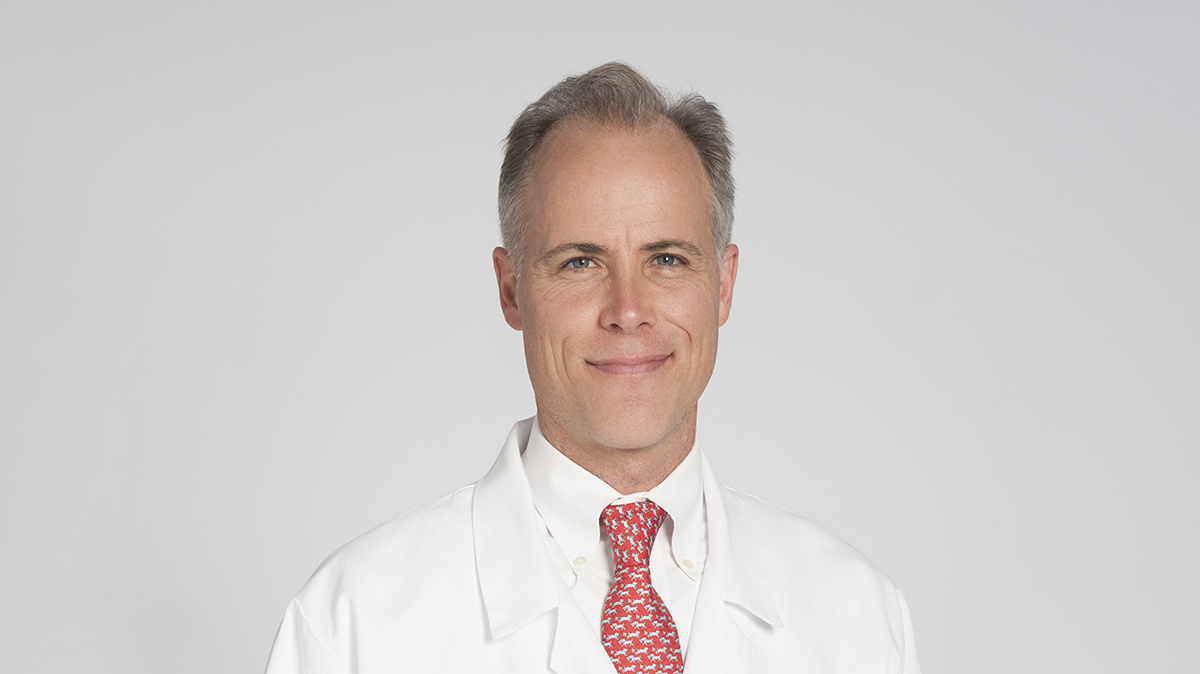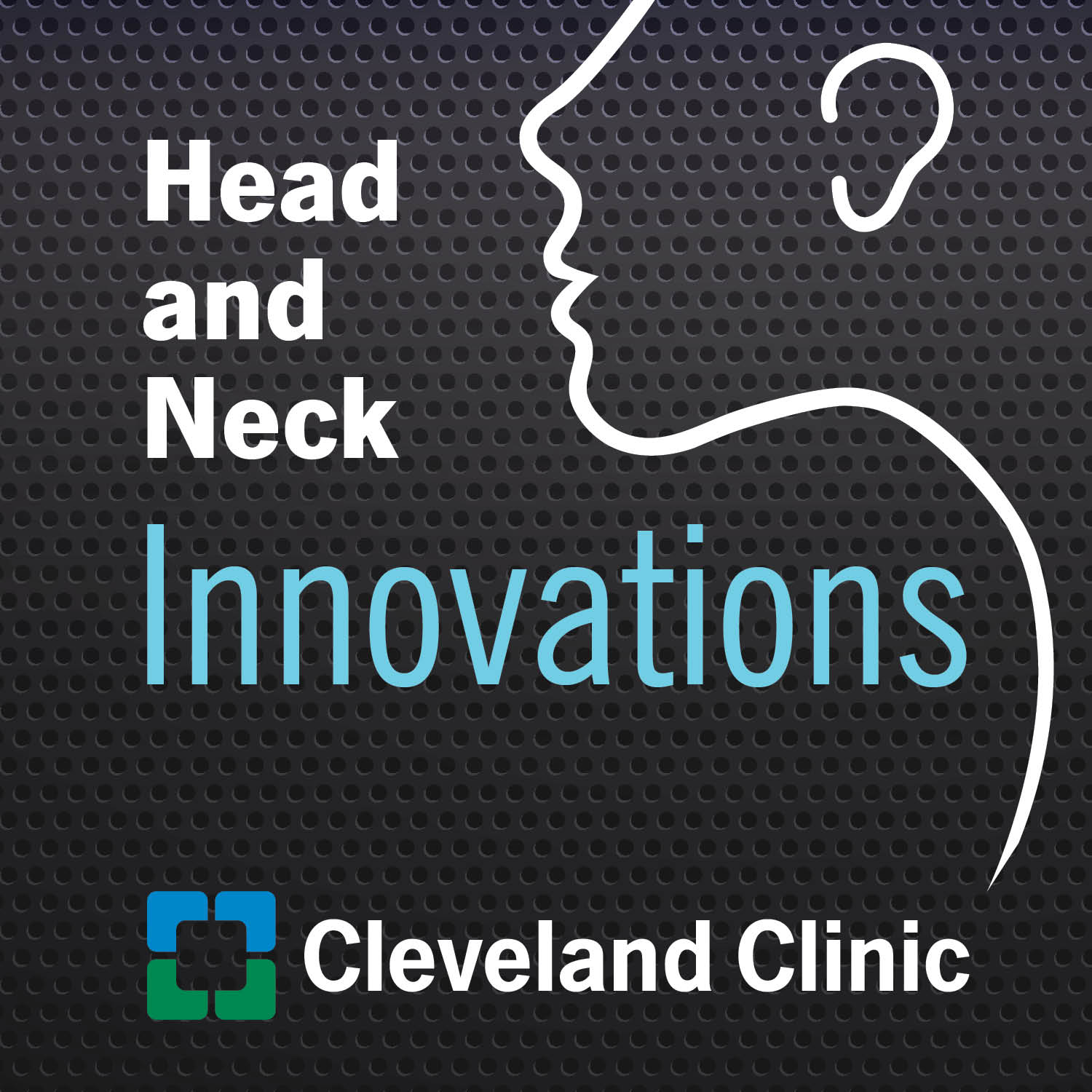Updates in Head & Neck Cancer Research and Education

Subscribe: Apple Podcasts | Spotify | Buzzsprout
Updates in Head & Neck Cancer Research and Education
Podcast Transcript
Paul Bryson: Welcome to Head and Neck Innovations, a Cleveland Clinic podcast for medical professionals exploring the latest innovations, discoveries, and surgical advances in otolaryngology - head and neck surgery.
Thanks for joining us for another episode of Head and Neck Innovations. I'm your host, Paul Bryson, Director of the Cleveland Clinic Voice Center. You can follow me on X, formerly Twitter, @PaulCBryson, and you can get the latest updates from Cleveland Clinic Otolaryngology-Head and Neck Surgery by following @CleClinicHNI on X. That's @CleClinicHNI. You can also find us on LinkedIn at Cleveland Clinic Otolaryngology - Head and Neck Surgery, and Instagram at Cleveland Clinic Otolaryngology.
Today I am looking forward to speaking with Dr. Joseph Scharpf, Director of Head and Neck Endocrine Surgery at Cleveland Clinic, and Vice Chair of Education for Otolaryngology-Head and Neck Surgery. I encourage everyone to go back and listen to Dr. Scharpf’s previous Head and Neck Innovations episode from last year discussing thyroid cancer management and treatment. Welcome back to the podcast, Dr. Scharpf.
Joseph Scharpf: Thank you. I'm glad to be here, Dr. Bryson.
Paul Bryson: Well I encourage everyone to go back and listen to Dr. Scharpf’s previous Head and Neck Innovations episode from last year where we discussed thyroid cancer management and treatment. But for our new listeners, let's start by having you share some background on yourself for our listeners, where you're from, where you trained, how you came to Cleveland Clinic.
Joseph Scharpf: I grew up in New York, but I've been in Ohio for a long time. I did my residency training at the Cleveland Clinic starting back in ‘98, so I've been at the Cleveland Clinic for about 26 years. Went away for one year to Iowa for a head and neck fellowship and then returned to work from that standpoint, and it's been a great experience, but it's gone quickly.
Paul Bryson: Yeah, it's surprising how quickly it goes. After a while, you see a lot of changes and also quite a bit of advancements, like we talked about with thyroid cancer during the last episode. It's timely to have you back on the podcast. April is Head and Neck Cancer Awareness Month, and we're excited to have you discuss some of the latest and most exciting when it comes to treating these cancers. Can you highlight some new research and trials that you and your colleagues are working on?
Joseph Scharpf: Sure. We've been very excited to take part in a clinical trial for anaplastic thyroid cancer, which is something I wasn't expecting to see in my lifetime. The kind of results we've been seeing for patients with perhaps the deadliest form of all cancers, not just thyroid cancer, patients are being treated with targeted therapies with dabrafenib, trametinib and pembrolizumab, and it's opening a whole new area of opportunity for these patients, hope for these patients, and we will be continuing to look at advancements for anaplastic, but other more invasive and aggressive cancers too.
We're very excited about looking at other targets for thyroid cancers working in a multidisciplinary approach, and it's changed dramatically from the beginning of my career where really surgery and more radical surgery might have been the only option for patients. Now, we've integrated targetable therapies with surgery, even radiation to give important quality of life issues for patients, functional outcomes with a huge emphasis through this multidisciplinary approach we've had.
Paul Bryson: Thyroid cancer aside, what else is on the horizon with some additional research? I know the annual head and neck meeting is coming up in the spring as well, and we'll probably highlight some of that on another podcast, but any previews or anything else that the group's doing that you're excited about?
Joseph Scharpf: Yeah, there's so many advancements we've had within the group and a lot of it's coming from what we've seen in the thyroid cancers. We get to know the mutation profiles of these cancers and the way they act. We have different ways to evaluate cancers, and so liquid biopsies following outcomes from HPV in particular and how patients are responding is changing the way we look at cancers and our surveillance strategies for them. It gives us important prognostic information and maybe lets us intervene at an earlier point in time than we have in the past.
Paul Bryson: It's pretty exciting technology and pretty easily obtained for patients too.
Joseph Scharpf: Very, very easy, and it's being worked out and confirmed in many institutions now, so it's going to be certainly a new standard of care, I think.
Paul Bryson: Well, I wanted to shift gears a bit and discuss leadership and education with you. As Cleveland Clinic is an academic medical center, educating the future of healthcare, it's an important part of what we both do along with our colleagues. Can you talk about your role as Vice Chair of Education and what some of your goals are with this position as you look at 2024 and beyond?
Joseph Scharpf: So I serve as our representative for education within Head and Neck, but in aggregate, the Cleveland Clinic has an enormous footprint in the education world and really has put huge emphasis in it. Dr. James Stoller is the head of the Education Institute. It's an area where there's over a hundred million dollars of funding a year for it, so it's really something that's taken very seriously here and it's got a broad scope all the way from kindergarten all the way through postgraduate education.
In terms of what's being offered within our institute, I've looked at this in a broad scope as well in that I've want to be really focused on helping trainees, our current staff, and also alumni. They're certainly learning new disease processes coming out, so we're working on a lot of CME courses. We have, one thing I'm particularly proud of is professional development lectures, which is a bit transformative from what I had been exposed to in training where we look to bring in speakers both internally, which we have so much wealth here internally to call upon and externally to talk about topics that might not be clinical oriented, but still very important - issues of leadership, issues of education, perhaps an MBA as you have in a career, and what could that help a physician with issues for finance, hospital budgets, life- work balance, a culture of engagement...
A whole issue of nonclinical topics from a professional standpoint I think has been really valuable for our trainees. Aside from the trainees, we're also looking at holistically our allied health professions that we work with and having them involved as well as our nurses, administrators, having them involved coming to our courses. My goal is to have some breakout sessions from CME courses and we're having more and more CME courses that are getting offered from our institute, so we've had a longstanding head neck course now. We're going to have a facial plastics course in the summer. I know there's going to be laryngology speech courses coming up as well as courses from our other sections as well, and I think those are going to be great opportunities for, again, our trainees, our current staff, our alumni to come. It'll be important for our allied health professions to be involved with. It's been a very good positive experience overall.
Paul Bryson: It's been great to see what you've done and kind of the future that lies ahead. I mean, the head and neck course has been sort of the template for it's a successful one, so I think we'll continue to see success in the CME realm, and then the lecture series is also very exciting. Like you said, there's no shortage of talent here, but the range of topics that I think have become important just beyond regular didactic work is pretty extensive.
Joseph Scharpf: Yeah, I mean, we're looking to, as we have always done at the Cleveland Clinic, put out people who are going to be leaders throughout the country, the world and I have never had any concerns about the clinical didactics we've had, but they have to be ready to adapt to a very quickly changing world and different expectations, different challenges, and I think this will create a better rounded physician coming out.
Paul Bryson: You had talked about with the Education Institute, medical exposures for kindergarten and on. As you think back, what message would you give to maybe medical students or even people that are younger that might be interested in the medical field? It's hard to know. Our listener might be perhaps our age or vintage, but we may have some younger listeners at different time points in their educational journey.
Joseph Scharpf: Yeah, I would say definitely don't shy away from it. No one in my family had been in medicine. I felt a calling to it early in life. I always kind of wanted to have a meaningful, impactful career, not necessarily a comfortable career, and I think medicine is an area where you have a huge, meaningful, impactful career and not always comfortable. You see people suffering from various ailments, but it's still such a wonderful field to go into and there's so many opportunities within medicine, whether it's from the innovative research side to the clinical care side to administrative leadership positions. I think it's a great opportunity for young people to still always look into, and I certainly don't have any regrets.
Paul Bryson: Yeah, I mean, I would say from where we're at now in our careers, it's for those listening. I mean, seek out mentors, look for people to sponsor you, try to get those experiences because like you said, you can really make an impact on people in lots of different ways, either directly or through other work opportunities,
Joseph Scharpf: And I've been so fortunate here to have great mentors, coaches, sponsors, all of them, and they all play different roles and great colleagues and friends here too.
Paul Bryson: Well, appreciate you coming back to the podcast today. It's great to have you.
Joseph Scharpf: Alright, well thanks as always. It's a wonderful podcast. Thanks for doing it.
Paul Bryson: To read more about our latest head and neck cancer research, visit our consult QD website at ConsultQD.ClevelandClinic.org/HeadAndNeck. That's ConsultQD.ClevelandClinic.org/HeadAndNeck. And to speak with one of our specialists or submit a referral, please call our Cancer Answer Line at 866.223.8100. That's 866.223.8100. Dr. Scharpf, thanks for joining Head and Neck Innovations.
Joseph Scharpf: Thank you, Dr. Bryson.
Paul Bryson: Thanks for listening to Head and Neck Innovations. You can find additional podcast episodes on our website clevelandclinic.org/podcasts. Or you can subscribe to the podcast on iTunes, Google Play, Spotify, Buzzsprout, or wherever you listen to podcasts. Don't forget, you can access realtime updates from Cleveland Clinic experts in otolaryngology – head and neck surgery on our Consult QD website at consultqd.clevelandclinic.org/headandneck. Thank you for listening and join us again next time.



